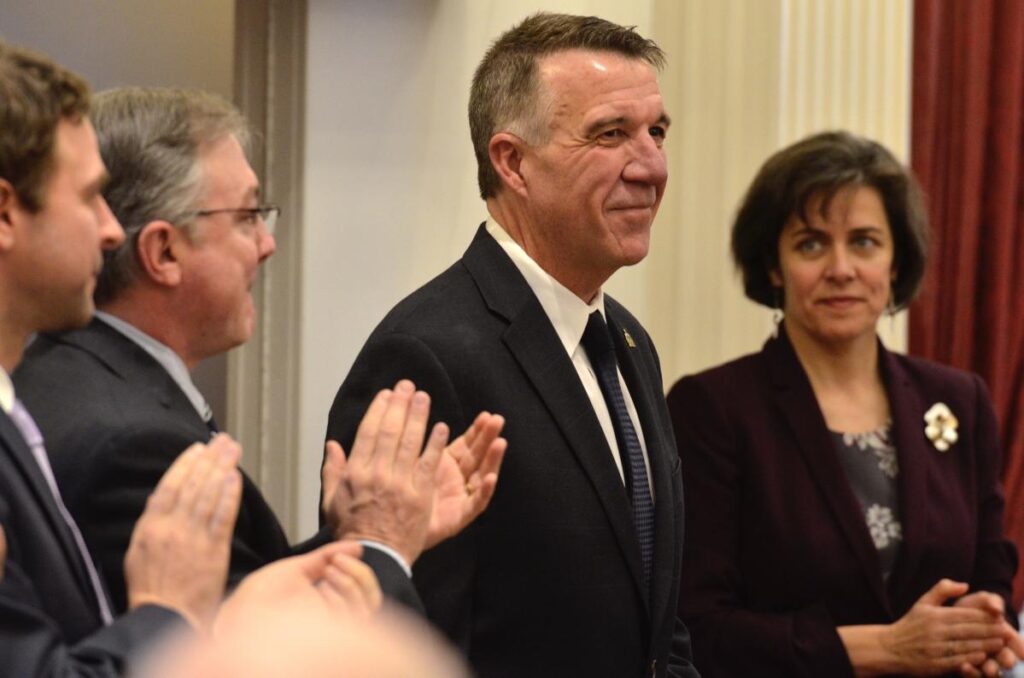In his fifth inaugural address on Thursday afternoon, Gov. Phil Scott (R-Berlin) announced his top priority for the new legislative biennium: tackling Vermont’s affordability crisis.
Scott emphasized two primary means to that end: education property tax reform and more housing.
But to accomplish these goals, the legislature – previously controlled by a Democratic supermajority – must commit to changing how they’ve operated, practically unbridled, for the past two years, he said.
In November, voters informed lawmakers they were “off course” when Republicans picked up more legislative seats than they had in decades, Scott said, describing it as a “very clear message” that Democrats had lost touch with Vermonters’ needs, especially rural voters, and that more bipartisan collaboration was needed.
Gov. Phil Scott arrives for his second inauguration Jan. 10, 2019 at the Statehouse in Montpelier.
“Let’s work together to pass bills that fix the problems that matter most to your constituents and set aside the ones that don’t,” Scott said. “Let’s put our communities above all else and reset the playing field so it’s fair and benefits all of Vermont.”
Lawmakers must “reform,” not “tinker” with education funding system
The solution for decreasing education property taxes – which have skyrocketed 33% on average over the past three years – is to completely change the funding system that has become “out of scale and very expensive,” Scott said.
He emphasized that Vermont is among the top education spenders in the U.S but remains in the middle in terms of quality. Previous legislative attempts to make improvements in both areas have failed because you can’t “tinker with an existing structure that simply doesn’t work,” he said.
Rural and less prosperous Vermont communities, populations Scott said the legislature has “neglected” for years, are especially burdened with rising property taxes, he pointed out.
“Just throwing more money at problems hasn’t equaled success,” Scott said, urging lawmakers to focus on fixing the funding formula’s “underlying structural issues” to avoid gambling away taxpayers’ “hard-earned money.”
“Let’s have the courage to fix the entire system,” Scott said.
“Housing is a great place to start”
In his address, Scott reiterated his stance that Vermont’s shrinking youth and working adult populations is a leading cause of the state’s affordability crisis.
Building more housing “is a great place to start” in convincing Vermonters to stay and out-of-staters to move here, he said. Currently, people are struggling to find housing in general, let alone affordable places to live. And that problem is posed to only worsen if Vermont doesn’t more than triple the number of housing units they’re posed to produced over the next five years.
“We need more taxpayers, not more taxes,” Scott said.
Scott previews plans for housing, tax reform
Scott provided a glimpse into the housing and tax reform proposals he and his administration will present to the legislature in the coming weeks.
Scott’s housing proposal will suggest growing the Tax Increment Finance (TIF) and Vermont Housing Improvement Program (VHIP) programs, focusing on revitalization of “neglected communities” and “working class neighborhoods,” expanding ACT 250 exemptions to help rural communities and more.
As for the governor’s tax reform proposal, which will be unveiled at his budget address on Jan. 28, Scott said it will include a brand new “student-centered” funding formula that regulates costs while also improving education opportunities for children; a simplified governance structure to improve and equalize education quality statewide; and provide support and framework for school boards and administrators to help them “reduce cost pressures.”
Most significantly, Scott’s tax reform plan will seek to drastically lower this year’s almost 6% property tax increase, with the intention to “eliminate” the increase completely.
However, Scott echoed House Committee on Ways and Means Chair Rep. Emilie Kornheiser’s (D-Brattleboro) sentiments from last month when he admitted “there are no silver bullets, no simple solutions” to Vermont’s myriad crises, but lawmakers “need to start somewhere.” Property tax reform and housing initiatives arevpoised to earn Vermont the “biggest gains,” he said.
“We’ll be juggling a lot of issues, but it’s more important than ever to prioritize and stay focused on the fundamentals that matter most to Vermonters,” Scott said.
“We don’t have a choice” but to work together
House Speaker Jill Krowinski (D-Burlington) held a press conference following Scott’s inaugural address on Thursday afternoon, during which she affirmed the governor’s point about the importance of bipartisan collaboration this biennium.
“We don’t have a choice” if we want to make progress on important issues such as education tax reform, Krowinski said about working closely with Republican colleagues. She added that both parties would have each other’s backs should the legislature have to defend hard and potentially unpopular decisions to constituents.
Krowinski also said Democrats were “laser focused” on education property tax reform.
“I can’t emphasize enough that education funding is a huge priority,” she said. “We can’t leave the legislative session without a big change.”
Megan Stewart is a government accountability reporter for the Burlington Free Press. Contact her at mstewartyounger@gannett.com.
This article originally appeared on Burlington Free Press: Governor Phil Scott inaugural address names top priorities
Read the full article here


